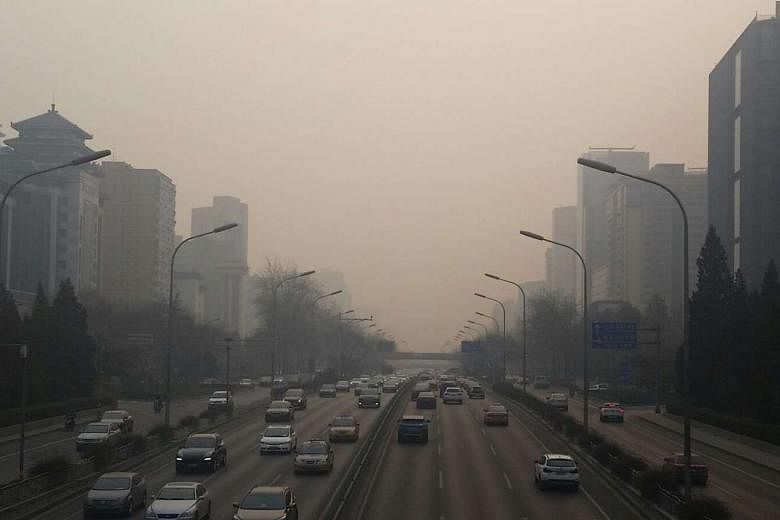BEIJING (AFP) - China's capital issued its first ever red alert for pollution on Monday (Dec 7), as a new blanket of choking smog was projected to descend on the city.
From Tuesday morning, half of Beijing's private cars will be ordered off the road, with an odd-even number plate system in force, and 30 per cent of government vehicles also garaged.
High-polluting factories and construction sites will also have to cease operations, Beijing's Environmental Protection Bureau said on its verified social media account, with fireworks and barbecues also banned.
"People should to the best of their ability reduce outdoor activities," it said. "If you are engaging in outdoor activities you should wear a mask or take other protective measures."
Kindergartens, primary and middle schools were urged to close, it added, without explicitly making the measures mandatory.
The red alert came a week after a thick grey haze shrouded the capital with concentrations of PM2.5, harmful microscopic particles that penetrate deep into the lungs, as high as 634 micrograms per cubic metre.
The reading given by the US embassy dwarfed the maximum recommended by the World Health Organisation, which is just 25 micrograms per cubic metre.
It also coincided with global climate change talks in Paris, where Chinese President Xi Jinping has vowed "action" on greenhouse emissions.
Most of China's greenhouse gas emissions come from the burning of coal for electricity and heating, which spikes when demand peaks in winter and is the main cause of smog.
The issue is a source of enduring public anger in China, which has seen breakneck economic growth in recent decades but at the cost of widespread environmental damage.
Pollution is blamed for causing hundreds of thousands of early deaths every year.
China is estimated to have emitted nearly twice as much carbon dioxide as the United States in 2013, and around two and a half times the European Union's total.
Beijing has pledged that emissions will peak "around 2030", without saying at what level and implying several years of further increases.
It has promised to reduce coal consumption by 100 million tonnes by 2020 - a small fraction of the 4.2 billion tonnes it consumed in 2012 - and cut 60 percent of "major pollutants" from coal-fired power plants, without specifying the chemicals in question.
On Monday evening PM2.5 levels were 206 micrograms per cubic metre according to the US embassy, and 187 according to local authorities. But visibility was significantly better than the previous week.

